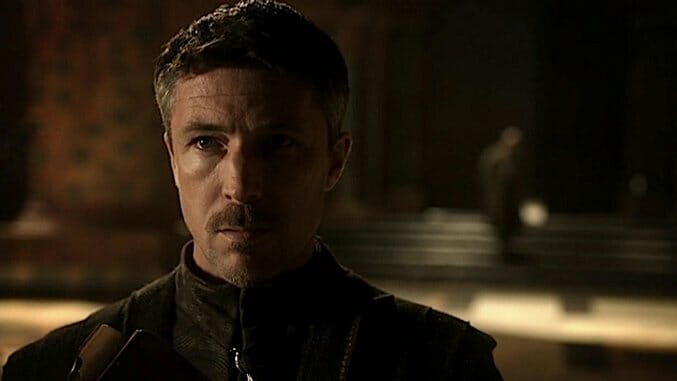Game of Thrones’ Littlefinger is a Genius in the Books, and an Absolute Idiot on the TV Show

The first time we get a full description of Petyr Baelish’s rise to the King’s Council comes in George R.R. Martin’s second book, A Clash of Kings. Here’s what he writes, in a Tyrion POV chapter—the passage is long, but worth reading in its entirety to get a full sense of the cleverest man in the seven kingdoms:
If ever truly a man had armored himself in gold, it was Petyr Baelish, not Jaime Lannister. Jaime’s famous armor was but gilded steel, but Littlefinger, ah…Tyrion had learned a few things about sweet Petyr, to his growing disquiet.
Ten years ago, Jon Arryn had given him minor sinecure in customs, where Lord Petyr had soon distinguished himself by bringing in three times as much as any of the king’s other collectors. King Robert had been a prodigious spender. A man like Petyr Baelish who had a gift for rubbing two golden dragons together and breeding a third, was invaluable to his Hand. Littlefinger’s rise had been arrow-swift. Within three years of his coming to court, he was master of coin and a member of the small council, and today the crown’s revenues were ten times what they had under his predecessor…through the crown’s debt had grown vast as well. A master juggler was Petyr Baelish.
Oh, he was clever. He did not simply collect the gold and lock in a treasure vault, no. He paid the king’s debts in promises, and put the king’s gold to work. He bought wagons, shops, ships, houses. He bought grain when it was plentiful and sold bread when it was scarce. He bought wool from the north and linen from the south and lace from Lys, stored it, moved it, dyed it, sold it. The golden dragons bred and multiplied, and Littlefinger lent them out and brought them home with hatchlings.
And in the process, he moved his own men into place. The Keepers of the Keys were his, all four. The King’s Counter and the King of Scales were men he named. The officers in charge of all three mints. Harbormasters, tax farmers, custom sergeants, wool factors, toll collectors, pursers, wine factors; nine of every ten belonged to Littlefinger. They were men of middling birth, by and large, merchant’s sons, lesser lordlings, sometimes even foreigners, but judging from the results, far more able than their highborn predecessors.
No one had ever thought to question the appointments, and why should they? Littlefinger was no threat to anyone. A clever, smiling, genial man, everyone’s friend, always able to find whatever gold the king or his hand required, and yet of such undistinguished birth, one step from a hedge knight, he was not a man to fear. He had no banners to call, no army of retainers, no great stronghold, no holdings to speak of, no prospects of a great marriage.
This is the terrific backstory of a man who we would consider one of the George R.R. Martin’s greatest characters—someone who is cunning, but knows enough to hide his cunning. He has a sharp tongue at times, especially when dealing with Ned Stark in A Game of Thrones, but he knows when to sheathe that tongue, and his real talent lies in his ability to win influence and power, without ever exposing himself to mortal danger. Every risk he takes is calculated, and though the simple reality of a lowborn lord trying to win the game of thrones comes with inherent danger, he knows how to protect himself within his ambition.
We compared Littlefinger’s rise to that of Alexander Hamilton a couple weeks ago, and for good reason: this is a portrait of a man who has spent years quietly acquiring power, mastering finance and currying favor with the people that matter. And now, as the rest of Westeros tears itself apart, the book version of Petyr Baelish sits in the Seven Kingdoms’ most impregnable castle, the Stark heir by his side and a massive host at his command. If book-Littlefinger were playing Risk, he’d be that person who takes Australia early on, makes nice to all the players clashing over the Americas and Europe, then trades in a big card set and conquers Asia in one fell swoop. Game over.
The same cannot be said of the corresponding character in the TV shows. On HBO, Baelish is by turns peevish, impulsive (to the point of recklessness), and transparent. His entire demeanor, far from being “genial” or “friendly,” is sinister in the most exaggerated way possible. He’s not the kind of character who could win anyone’s trust, and he’s eminently noticeable in the worst ways—he’s the kind of guy who literally stares at the Iron Throne with longing.
There are perhaps a dozen examples of his stupidity in the show that do not correspond to the subtle machinations of “Book Baelish.” Here are a few:
1. Littlefinger and Sansa
-

-

-

-

-

-

-

-

-

-

-

-

-

-

-

-

-

-

-

-

-

-

-

-

-

-

-

-

-

-

-

-

-

-

-

-

-

-

-

-








































